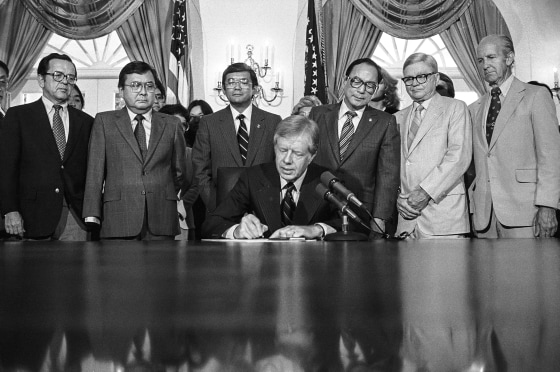
Asian Americans and Pacific Islanders reflect on the historic impact the former president made to the community as the country mourns the death of Jimmy Carter, who passed away Sunday at the age of 100.
The nation’s 39th president, Carter, signed a proclamation declaring May 4, 1979, to be the first day of Asian Pacific American Heritage Week in response to pressure from a number of Asian American congressmen. For the first time in the nation’s history, the racial group held a celebration that was acknowledged nationally. The week would be prolonged decades later, and it is currently observed yearly as Heritage Month.
Carter noted in his proclamation, “Unfortunately, we have not always fully appreciated the talents and contributions that Asian-Americans have brought to the United States.” However, Asians from a variety of countries, including China, Japan, Korea, the Philippines, and Southeast Asia, still saw America as a place of opportunity, freedom, and optimism.
Carter’s announcement, according to Madalene Mielke, president and CEO of the Asian Pacific American Institute for Congressional Studies, was a significant step in recognizing the racial group’s important contribution to the nation’s history.
Mielke told NBC News that it truly gave rise to the notion that we are not expendable constituents. That is essentially how this nation has begun to acknowledge us as a group and as individuals who have been engaged citizens and contributors to its development.
In June 1977, then-Reps. Frank Horton, R-N.Y., and Norman Mineta, D-Calif., who was Japanese American, filed legislation that would have formally established a 10-day heritage celebration. This was followed by Carter’s proclamation. Fellow Asian Americans and Democrats from Hawaii, then-Sens. Daniel Inouye and Spark Matsunaga, did the same, presenting sister legislation in the Senate.
Horton advocated for a second joint resolution that would declare a week of celebration, which would cover the seventh and tenth of the month, even though neither bill passed. The president eventually signed the successful initiative. President George H.W. Bush extended the memorial week to a month in 1992.
The month of May was selected to honor the arrival of the first Japanese immigrants in the United States on May 7, 1843. On May 10, 1869, it also marks the completion of the transcontinental railroad, which was mostly constructed by Chinese railroad laborers.
Mielke emphasized that without the decades of effort put forward by Asian American and Pacific Islander campaigners and lawmakers, who had long supported the racial group, Carter’s national recognition would not have been possible.
Former Secretary Mineta firmly maintained that there should be no commonality in this regard. According to Mielke, he firmly felt that we were weaved together as a nation since each of our individual identities contributed to the formation of this nation. This kind of acknowledgment is a component of realizing that we are not simply assimilating into society, but rather evolving and altering what society and what is considered American.
According to her, Carter’s announcement was a sort of show of unity.
His efforts supporting all the members of Congress who wanted to ensure that this was a recognition for our community is, in my opinion, his greatest legacy, she added.
According to Mielke, the declaration also encouraged lawmakers from other communities to value AAPI and was a significant symbol of allyship.
However, that does not imply validation. She stated, “It’s really how you work allyship.”
Note: Every piece of content is rigorously reviewed by our team of experienced writers and editors to ensure its accuracy. Our writers use credible sources and adhere to strict fact-checking protocols to verify all claims and data before publication. If an error is identified, we promptly correct it and strive for transparency in all updates, feel free to reach out to us via email. We appreciate your trust and support!
